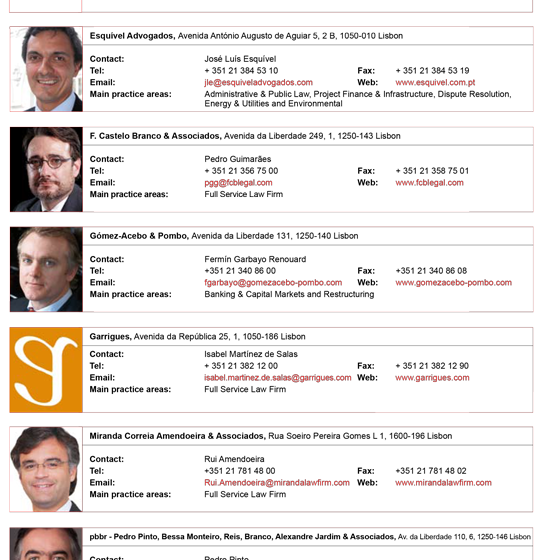A global education
Competition within legal education is intensifying and universities are adopting a more international and innovative outlook to add real value in the marketplace.
Legal education has increasingly internationalised over the past 20 years in the same way as the legal profession itself. Universities worldwide are battling for the top talent and, as with law firms, a band of elite institutions is emerging, with Iberian ones leading the charge.
The Financial Times’ global LLM law school list ranks among the top world-wide establishments Spain’s ESADE, IE Law School, Instituto Superior de Derecho y Economía (ISDE) and Universidad Pontificia Comillas University – ICADE, and Portugal’s Católica Global School of Law.
Looking internationally
Competition is intensifying, and many Iberian lawyers are increasingly looking to the UK or US to progress their studies. To avoid an exodus to Anglo-Saxon colleges, offering courses in English is now a pre-requisite. Católica has two English-language LLMs directed at international students wanting to look at transnational and European legal matters – and this year it also established the first English language PhD programme in Portugal.
Iberian universities enhance this English pre-requisite via direct links with global peers. ISDE teams with St. Johns University in the UK, while IE Law School has an agreement with Northwestern University in the US and a dual LLM programme with King’s College London.
“Internationalisation is one emerging theme,” says Javier de Cendra, Dean at IE Law School. “Some courses are offered completely in English with foreign exchange programmes. That trend is going to move faster as technology develops in the classroom too.”
Technological advances
Indeed, technology has forced law schools to embrace the future. Resources must be accessible anywhere in the world, with almost all now having a virtual hub to store presentations and materials, including digital versions of all domestic trials.
“We have developed our own databases where we have real cases, and the students work in groups and, then present the solution to the lawyers in charge of the case and their respective clients,” explains Eduardo Berché, Dean at ESADE.
One outcome of an online presence is that more LLMs are effectively taught through e-courses. Spain’s IE Business School already offers virtual executive LLMs and the US’s Harvard has more than 200 – although only two are in legal studies courses. As further examples, India’s Rainmaker – a learning, content and technology company, the US’s 2U – which develops online courses in partnership with leading universities, and UK law firm CMS Cameron McKenna, also provide a variety of remote courses.
2U partners with Washington University School of Law on an online LLM Programme, and Ken LaOrden, 2U General Manager, says that it mirrors traditional teaching via vibrant and rigorous discussions in live classes rather than recorded lectures. “The online programme does, however, offer self-paced coursework that students work through in preparation for the live classes.”
Iberian law schools are wary of compromising their academic offering while enhancing online capacity, they say. The options for post-graduate education have historically been limited – the LLM Guide, a comprehensive and up-to-date directory, states that 14 establishments in Spain and two in Portugal offer LLM programmes – so quality is key.
“Generally, law schools are not the most appropriate places for new technology as the approach is very traditional,” says Ramon Ragués Professor at Pompeu Fabra University. “It makes no sense to try to compete with distance learning as law schools offer unparalleled access to leading lecturers.”
It is the balance between direct teaching and digital support that is vital. Accessing online resources, uploading exams and downloading papers must not come at the expensive of top lecturers’ expertise. Many institutions, including Harvard and Católica, make a point of the so-called ‘intimate’ learning. Scott Westfahl, former practising lawyer, Consultant at McKinsey & Company and the new Director of Executive Education at Harvard Law School says Harvard focuses much less on lectures and more on highly interactive, case-based discussions between professors and small groups of students. “It is about interaction and sharing of knowledge and experience, and it is the kind of learning you simply cannot obtain or absorb from watching a YouTube video.”
LaOrden at 2U adds that 2U’s classes are limited to 15 students and particular relevant for international candidates. “We are finding that the students who are attracted to the online programme are experienced lawyers in their home countries with dynamic law practices – not the more typical recent law graduate with little legal experience.”
Business outlook
Academic education is not always the priority for practising lawyers, and revered institutions, such us Harvard, now operate successful executive education programmes too. Harvard’s flagship ‘Leadership in law firms’ programme allows candidates to meet academics and lawyers from all over the world to expand their networks. Harvard has also developed alumni networks so participants stay in touch once the course is over.
“We focus on helping lawyers build skills that can be used anywhere in law or business, such as leadership, management and strategy,” Westfahl at Harvard explains. “Because our programmes are broadly attended by lawyers from around the world, they also help participants to significantly grow their professional networks.”
Many Iberian colleges are following suit. IE offers LLMs jointly taken with an International MBA, a Master in Management or a Master in International Relations.
As a part of the development of lawyers, it is necessary to include management skills to prepare them at each stage, adds Berché at ESADE. “There are multiple roles undertaken by the lawyers in a firm – strategy, marketing and business development, leadership and also the new client’s perspective on legal services provision, as well as the knowledge of their business sector.”
Business skills are set to grow at Spanish graduate-level too following the EU-wide Bologna reforms. This replaced a five-year degree that allowed graduates to practise straight out of university with a four-year degree and a subsequent ‘Masters’ year, before a bar exam. A Masters – once a rarity for graduates – is now a requirement.
Maria Alcolea from Europea de Madrid University says that all universities are offering the Masters, so competition is intense. “There are not that many graduates, therefore universities are offering something different to attract students to their Masters programmes.”
The new Masters must include training and placements, so many law schools are looking towards solutions to differentiate themselves, as happened in Portugal. “The ability to have management tools and business knowledge is vital for a lot of younger graduates and practising lawyers,” says Luís Barreto Xavier, Dean at Católica.
A number of Católica’s LLM and Portuguese Masters courses are in conjunction with its business school, while Pompeu Fabra University’s undergraduate courses include a lot of wider business issues, such as law firm management and marketing, as well as an option of law firm finances for which students get credits. Courses are led by senior partners but also law firm professionals, such as finance directors and HR managers, to provide a non-lawyer perspective.
Merging masters
Colleges are also mirroring LLMs in their Masters by expanding their international links. Europea de Madrid University linked-up with the Chicago-Kent College of Law at the Illinois Institute of Technology. The Spanish establishment has visiting professors and students can visit the US. While the University does not offer an international LLM, the joint initiative offers a Certificate in International and Comparative Law that is acknowledged as credits towards a US LLM. Alcolea at Europea de Madrid University says that way graduates can take the first steps before seeing if they really want to pursue the full LLM.
IE Law School integrated the new Masters course within its existing LLM because students are spoilt for choice, says de Cendra. “We did not want to compete on that level, so thought it was more effective to create a double degree by joining our existing Masters and the new Masters rather than offering them separately.”
It is not clear how the changes in Spain’s legal education will reshape the market. Ragués at Pompeu Fabra University points out that the new post-Masters Bar Exam is very general, so it is difficult for graduates to specialise. “Increasingly, students are going to need two Masters degrees – one after their degree and another in a specialist area – if that want to progress.” At the moment it appears that lots of students are thinking about taking an international LLM straight after their studies.
“Successful lawyers develop across three strands – they build their legal knowledge and expertise, professional and business skills, and their networks,” Westfahl Harvard Law School summarises. “We do not focus on the former since practicing lawyers build their legal knowledge and expertise through working with the law every day. “
In such an environment, Iberian law schools know that they need to bolster their strong academic know-how with cutting-edge business training if they are to stay competitive in attracting top lawyers from both generations.












